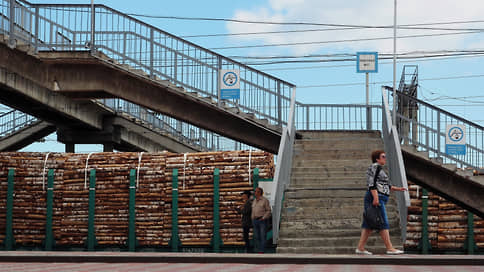Boards got tangled in transit schemes – Newspaper Kommersant No. 22 (7467) of 02/07/2023
[ad_1]

Timber container carriers, as well as the timber industry, are complaining about the legal conflict that has stopped the rail transit of sawn timber through Kazakhstan to China. At the same time, road transit is allowed. Carriers are concerned that under such conditions, timber cargo will move en masse through the already overloaded checkpoints on the Russia-China border. And the enterprises of the timber industry note that the countries where deliveries can be made through Kazakhstan – not only China, but also Uzbekistan – are very important for the industry, and now they can be squeezed out by competitors, for example, from Belarus.
Rail carriers and shippers of timber cargo complain about the revised procedure for their transit through Kazakhstan to China and other countries. As explained in the Eurasian Union of Rail Transport Participants (ESU, unites container operators), since September 2022, the union has been receiving requests from operators who are faced with a ban on the export of timber by container trains through checkpoints on the border with Kazakhstan, including those following in transit to China . Customs officers, explain in the ESP, motivated the refusal to pass by government decree No. 521, which defines checkpoints for the export of certain goods from the Russian Federation, which until the summer of 2022 did not apply to goods exported to Kazakhstan and Belarus. In November, the decree was amended to allow the export of timber cargo to the EAEU countries by rail, but the issue of transit was not covered, and since December 24, when the changes came into force, container trains going through Kazakhstan to China began to be stopped. On December 30, new amendments were adopted, which entered into force on January 31, and according to them, rail transit through the EAEU is actually prohibited: timber cargoes can depart from the territory of the Russian Federation outside the customs territory of the EAEU only through Zabaikalsk and Grodekovo (directly to China) or through Naushki in transit through the territory of Mongolia. At the same time, there is no such problem for motor transport: three checkpoints have been identified with Kazakhstan and one with Belarus.
“Since in 2022 there was a significant reduction in export deliveries of wood products (sawn timber – by 20–25%) due to the closure of Western markets, it is expected to strengthen state support measures for timber industry enterprises through obtaining priority for their transportation and logistics subsidies. Exporters will increase the volume of traffic to friendly countries, that is, they will go east en masse,” says Tatyana Maksimova, Deputy Executive Director of the ESP. “In this regard, business fears that there will be an additional load on the Zabaikalsk, Grodekovo and Naushki checkpoints, the processing capacity of which is already is at the critical limit. Therefore, now it is important to get an unambiguous answer from the regulators whether the transit of Russian lumber through Kazakhstan is possible.”
JSC Russian Railways confirmed the existence of the problem. The company addressed this to the federal executive authorities, they said: “As far as we know, the government is taking the necessary measures to resolve the situation.”
In the Ministry of Transport, Kommersant’s request was redirected to the Ministry of Economy, where Kommersant was told that Decree No. 2552 (adopted in December) was aimed “to expand the export opportunities of Russian suppliers of the woodworking industry.” According to the Ministry of Economy, it does not prohibit railway exports in transit through Kazakhstan, if it is processed wood. The Ministry of Finance did not respond to Kommersant’s request.
After the EU imposed sanctions against Russian lumber, China and Uzbekistan became the main sales markets, says a Kommersant source in a timber company. “After the departure of international container lines from the port of St. Petersburg, the only possible routes for the shipment of container trains to China were the border crossings of Grodekovo, Zabaikalsk and Naushki, as well as the ports of Nakhodka and Vladivostok,” he says.
“Another option was shipments through the Ozinkovo / Dostyk border crossing in transit through Kazakhstan. Unfortunately, the “revival” of the action of Decree 521 in September 2022 blocked this channel. In addition, shipments in transit to Uzbekistan, with which the Russian Federation does not have a land border, have stopped, ”continues the interlocutor of Kommersant. Twice-introduced amendments to the resolution did not fully resolve the issues of the possibility of shipment of lumber in transit through Kazakhstan, the Kommersant source notes. “Different departments interpret the provisions of the decree and amendments to it in their own way, which slows down transit and leads to an additional load on the eastern directions,” he says. “This leads to a collapse with the dispatch of container trains, overstocking of warehouses and, in the future, to a halt in production” .
As Kommersant was told in the Vyatka Chamber of Commerce, at the moment there is a paradox: deliveries of timber in transit through Kazakhstan by cars are allowed, but not by rail. They noted that manufacturers cannot achieve the official position of Russian Railways on this issue, and “out of ten requests for transportation, one is satisfied.” The organization notes that for many producers, markets that can be delivered through Kazakhstan are very important, especially given the current logging season. At the same time, the Chamber of Commerce and Industry reported that now the Uzbek market is even more attractive than the Chinese market, where prices for sawn timber and other products have decreased amid low demand due to the pandemic. At the same time, the domestic market cannot accept the produced volumes due to insufficient capacity, which is now aggravated by the seasonal factor. In addition, the chamber noted that if there is a delay in solving the current problem, Russia may be replaced by products from Belarus, which are supplied to Uzbekistan in an increasing volume.
[ad_2]
Source link





